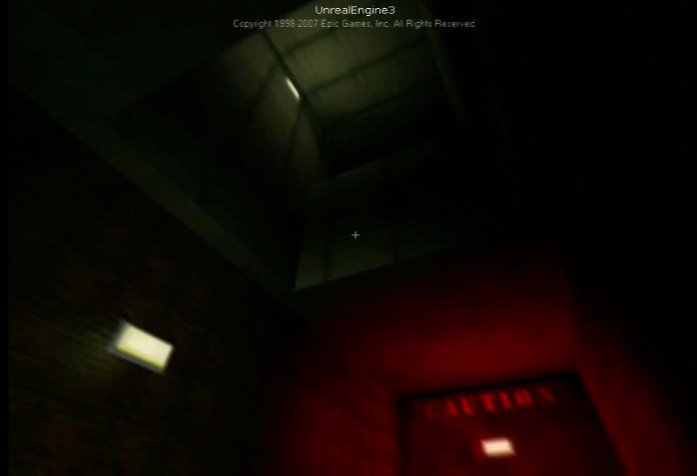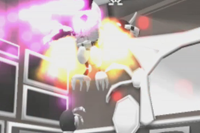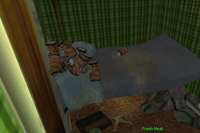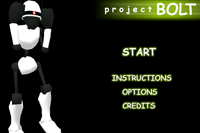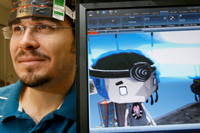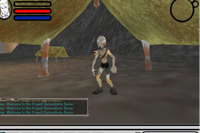Classes
The Drexel Gaming curriculum is a cross-discipline offering between the Digital Media (DIGM) program in the Antoinette Westphal College of Media Arts and Design and Department of Computer Science (CS) in the College of Computing and Informatics. The 3D gaming courses are taught by Digital Media faculty, where 3D modeling, animation, and effects are seen in animation production course projects such as found here. The Digital Media course offerings in modeling, animation, audio, video, web, etc. can be found on the Digital Media weblink above.
Note: To learn a little more about the classes, research, and the process of RePlay, you can also view a presentation with video given at EG2008 by Dr. Diefenbach by clicking here (~33MB).
Below summarizes the two majors for gaming:
- DIGM — Game Art and Production major — for students focusing primarily on the asset production (models, animations, sound, level design, game design, art, textures, etc.) with a secondary foundation in scripting.
- CS — Game Programming and Development concentration — for students focusing primarily on software design and programming for games, with a secondary foundation in asset pipelines and art production.
The curriculum provides conceptual understanding of game design and practical experience in the design and the development of games and consists of co-taught overview courses (DIGM 260) and a foundational courses (DIGM/CS 345) along with electives such as experimental and educational game design (CS 480) taught by Prof. Lee and a gaming workshop sequence (DIGM 461-462) designed by Prof. Diefenbach of Digital Media. Computer Science students may now select Game Development and Design as one of their tracks (areas of concentration, see bottom of page for details) and Digital Media students may take the gaming courses through their required and elective courses. Our gaming course offerings will be expanding by 10 new courses in the next 2 years, with the ability to Major in gaming in either Digital Media's Game Art and Production major or Computer Science's Game Programming and Development concentration.
The list of some of the current available core gaming courses follows, and examples of additional student work can be found at http://digm.drexel.edu/. CS & DIGM students work together in all of the core gaming courses. Syllabi for several courses can be found here.
Computer Gaming Overview (DIGM 260: offered Fall and Spring)
An overview of computer gaming including the history of computer games, their foundation in traditional games and game theory, and their practice in the modern digital game. The relation of gaming genres, platforms, and audience will be examined. The class will teach critical evaluation skills required for being a functioning member in a game development team.
Advanced Programming Techniques (CS 265, offered Fall and Spring)
Scripting for Game Development (DIGM 265)
This course is designed to provide an introduction to scripting for games, including concepts of time, states, and user interaction. Development work is performed in Adobe Flash and ActionScript.
Computer Game Development (DIGM 345/CS 345: offered Winter and Summer)
This course is designed to provide an overview to the pipeline process for video game creation, from asset creation to integration, as well as an overview to scripting for gaming. Students will be expected, by the end of the course, to effectively evaluate and utilize different game engines and tools for specific tasks. Students are exposed to a range of game technologies, engines, development environments, and scripting languages for both 2D and 3D development.
Game Development Workshop I (DIGM 361: offered Fall)
Game Development Workshop II (DIGM 362: offered Winter)
As part of the Game Development curriculum, Digital Media students and Computer Science students work together with other majors to design, prototype, and implement 3D video games in a model resembling the game industry. Games are developed in a variety of game engines such as Torque and using a variety of tools such as Maya, 3D Studio Max, and middleware packages. Project management, milestones, budget, asset management, and other soft-skills are stressed. In Game Development Workshop I, students work in groups of 4-6 to research and a develop a novel game concept, create a Game Design Document, and build a working game prototype. The best game is selected during a presentation before the school for full development in Workshop II by a multi-disciple team of 15 or more. Music majors, Script and Screenwriting majors, and others contribute to the final product. Project Bolt (www.projectbolt.com), designed by former Digital Media students Seth Kendall, Patrick Kemp, Juan Cardarelli, and Phil Doran, and developed in full by a team of 15 was the first full game produced by this course in 2005, and several team members have gone on to work in the gaming industry on games for the Playstation 3, Xbox360, and Nintendo Wii. See 3D games tab for other examples.
Educational Game Design (CS 480)
This course focuses on the design aspects of educational designs, and the unique challenges this offers. The goals of this course are as follows: (a) Understand and appreciate the critical role of psychology of play and the principles of game design in designing and developing educational games by reading and investigating current research results in game design, psychology of play, education, cognitive science, and human-computer interaction. (b) Understand and appreciate the critical role of an interdisciplinary team in designing educational games by working in a group composed of students from Computer Science, Media Art and Design, Education, and Psychology to design an educational game.
Experimental Game Design (CS 480)
This course is centered around rapid prototyping, evaluation, and re-design of small games based on certain themes. The focus of the course is on experimental game play and game design, that is trying to find new and innovative game mechanics and game play instead of creating YA FPS, RTS, RPG, etc. The format of the course is to take a topic every 3 weeks and have a small group come up with a playable game based on that topic. For example, the topic might range from something standard like gravity to something abstract like love. The inspiration and the motivation for the course comes from two sources: Indie Game Jam and The CMU Experimental Gameplay Project. Development work is performed in Adobe Flash or similar rapid development environments.
Senior Project
This is a 3-term capstone project where innovation is the key focus. Prior years have created brain interface games, head-tracking multiplayer web-based games, location tracking gammes, and a MMORPG game where the players characters mate and produce genetically-driven offspring.

